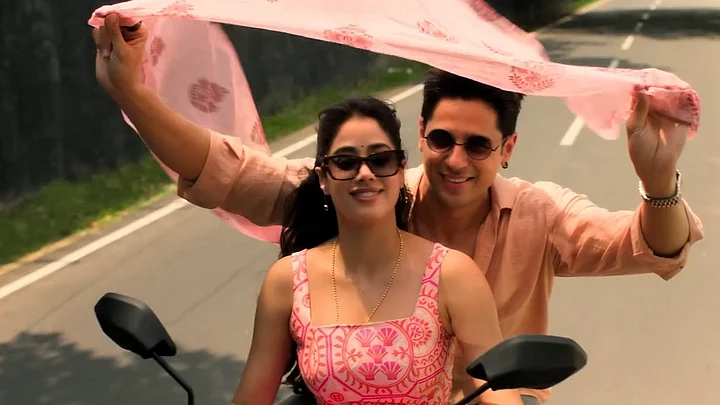In appearance, premise, and pretty-people-packaging, Param Sundari is perhaps the most Dharma Productions-iest looking film of the year — except it comes from Maddock Films. I stepped into the familiar, formulaic love story half-expecting a quintessentially Maddock “high-concept hook.”
Surely it can’t be as simple as 'Delhi boy travels to Kerala to fall in love with a Malayali girl'? Surely there must be a time-travel angle? Perhaps Janhvi Kapoor’s character is reincarnated? Sidharth Malhotra must be a ghost, right? Except nope, it’s exactly what it appears to be — a by-the-book, clash-of-cultures, fish-out-of-water love story.
Param (a sauceless Sidharth Malhotra doing his best decaf Rocky Randhawa impression) is the spoiled, entitled son of a Delhi industrialist (the always-enjoyable Sanjay Kapoor). Param spends his time as a tech investor and wants to back an experimental new dating app that claims to go beyond the usual suspects and use a person’s “energy and frequency” to find their one true soulmate.
When his dad threatens to pull the plug on this frivolous, expensive passion project, Param must prove that the app could be the next big thing, and decides to test it on himself. The algorithm claims his soulmate is Sundari (a sometimes endearing Janhvi Kapoor) - a Malayali girl in a quaint town in Kerala.
So, accompanied by his token comic relief ‘hero’s best friend’ (Fukrey’s Manjot Singh), and in spectacularly stalker-ish fashion, Param tracks down Sundari’s address and sets out to Kerala to meet the girl he’s never spoken to, to convince her fall in love with him, prove his point, and get his trust fund renewed.
Thankfully for Param, Sundari runs a homestay, making his morally murky mission seem marginally less creepy. In true modern Hindi-romance fashion (Rocky Aur Rani Kii Prem Kahaani, Loveyapa, Saiyaara), our female lead is not entitled to have any friends or a social life of any kind. Her social world is instead limited to a young sibling. Forget friends — she doesn’t even get parents. They died in a car crash while she was in college, forcing her to give up her artistic dreams and take over the homestay business. Sundari is then little more than a concept — a lonely, gorgeous damsel literally waiting around for a man to swing by, sweep her off her feet, and rescue her from her dull life.
Empty Packaging And Insensitive Stereotypes
Early on, Param Sundari, from director Tushar Jalota (Dasvi), tries to hit every ‘youthz’ buzzword and hashtag in a desperate attempt to be relevant to younger audiences. We get numerous exchanges between characters about Gen Z’s loneliness epidemic and obsession with data, devices, algorithms, and apps.
But that awkwardness is quickly dethroned by the film’s most uncomfortable stretch: its depiction of the people of Kerala and Malayali culture.
When Param first touches down in Kerala, he’s picked up at the airport by a drunk taxi driver; to find a phone signal, locals must climb coconut trees; the town’s go-to pastime is practicing Kalaripayattu, and I could go on.
Early on, the narrative (briefly) frames Param as the obnoxious, small-minded Delhi outsider who needs to have his mind opened. It’s a promising direction, but treating him as “the problem” achieves little when the gaze of the film treats the setting as a town of cartoons.
The delightful Rocky Aur Rani Kii Prem Kahaani, for example, did a far better job of finding the warmth within the stereotypes. Param Sundari’s uncomfortable gaze, on the other hand, feels similar to when white people make films set in India. I see you, Basmati Blues.
Stale Wine In An Old Bottle
The larger issue, however, is that even if we’re able to look past the lack of cultural nuance and dumbed-down stereotypes, the film fails to deliver on the bare basics of frothy, fizzy packaging: quippy dialogue, a peppy soundtrack, and an easy-on-the-eyes, goes-down-smoothly narrative.
Instead, writers Aarsh Vora, Tushar Jalota, and Gaurav Mishra give us a film that feels more like a blurry two-hour, montage-heavy music video peppered with a handful of instantly forgettable scenes.
What’s more, unlike most small-town-set romances and dramedies, which fall back on a talented supporting cast to bring the spark, Param Sundari bafflingly relies almost exclusively on the uncharismatic performances and dull chemistry of its two leads — and the stunning Kerala landscape — to bring the goods.
Ask any tired critic or discerning audience member, and they’ll tell you that, at this point, we aren’t stepping into these films expecting nuance, crackling chemistry, deeply felt romance, or even a consistently good time. That would be asking for too much.
At this stage, with the bar so low, we’ll even take storytelling that’s able to reach for the bottom of the barrel and give us one moment, one scene, one sequence, one idea, one song, one charming supporting character, one…something that’s able to bring a smile to our faces.
But Param Sundari staunchly refuses, despite a few concluding sequences that seem to flirt with fun (a boat race here, a wedding-chase sequence there), only to fizzle out.
In one (almost touching) scene, Param’s father confronts his son and lectures him that love and human connection can't be found on an app. No device can tell us who we should love. That should come from within.
It's ironic, considering this comes from a soulless film that stems not from the heart but from data and algorithm.
Param Sundari releases in theatres on August 29.
(Suchin Mehrotra is a critic and film journalist who covers Indian cinema for a range of publications. He's also the host of The Streaming Show podcast on his own YouTube channel. This is an opinion piece, and the views expressed above are the author’s own. The Quint neither endorses nor is responsible for the same.)
